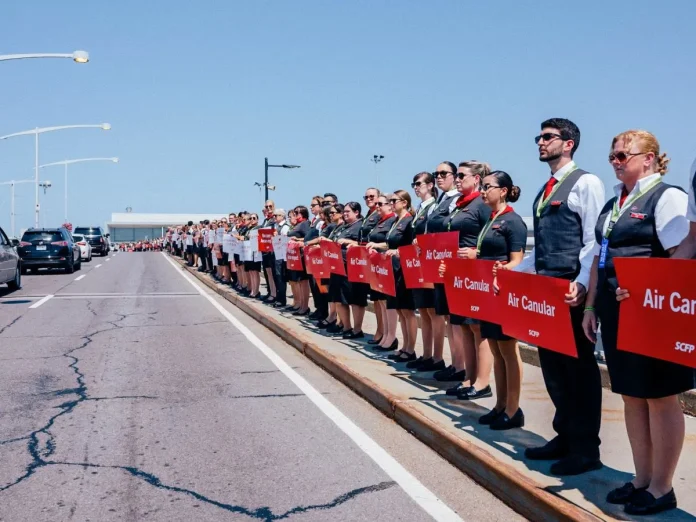Air Canada’s unionised cabin crew began a strike early on Saturday after pay negotiations broke down. This walkout, the first by flight attendants since 1985, is disrupting travel for over 100,000 passengers daily.
The Canadian Union of Public Employees (CUPE), which represents more than 10,000 flight attendants, announced the 72-hour strike on social media. Air Canada immediately cancelled all flights operated by both its mainline service and its low-cost subsidiary, Air Canada Rouge.
The airline warned that around 130,000 passengers will be affected each day the strike continues. It advised travellers not to go to the airport unless they hold confirmed bookings with another airline. Regional carriers, including Air Canada Jazz and PAL Airlines, continue to operate.
Flight attendants demand better pay and working conditions
The strike focuses on pay arrangements. Flight attendants currently earn wages only while the aircraft is in motion. The union wants them to receive pay for time spent on the ground, including assisting passengers during boarding.
Before the strike, Air Canada expected to cancel over 600 flights by Friday, affecting roughly 100,000 passengers. Picket lines are forming at major Canadian airports, and many travellers have already faced cancellations and rebookings.
Freddy Ramos, 24, described the chaos at Toronto’s Pearson International Airport. His flight was delayed, then cancelled, and finally rebooked to a different destination.
Government pressure and possible intervention
The strike has gained passenger support on social media, but Canadian businesses urged the federal government to intervene. Industry groups want Ottawa to enforce binding arbitration to resolve the dispute quickly, citing economic concerns.
Air Canada requested government intervention, but CUPE rejected the proposal. Under Canada’s Labour Code, the employment minister can ask the Industrial Relations Board to impose arbitration. Minister Patty Hajdu has instead encouraged both sides to return to negotiations.
Pay offers and industry concerns
Air Canada offered to pay flight attendants for some currently unpaid duties at half their hourly rate. The airline also proposed a 38 per cent pay increase over four years, including a 25 per cent rise in the first year. The union said the offer remains insufficient.
Analysts at TD Cowen advised the airline to compromise. They warned that ongoing industrial action could harm revenue during the peak season. They added that labour cost savings might be outweighed by lost income if the strike continues.
